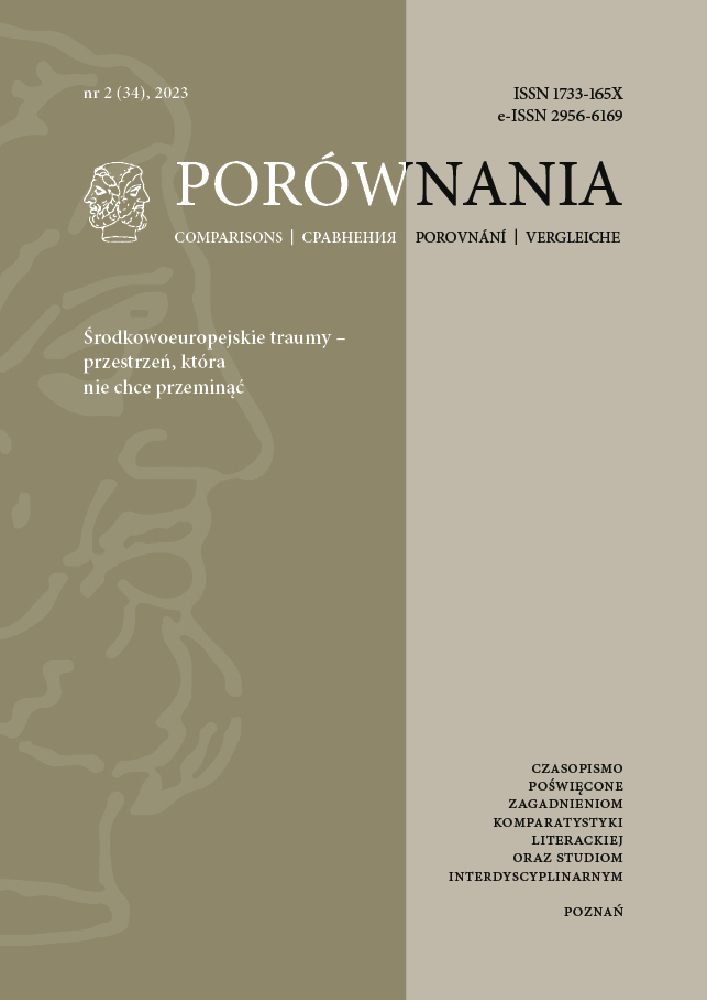Abstract
The article discusses the feminist politics of mourning in the poetry of Teresa Ferenc. The main assumption of the text is to highlight the subversive potential of the medieval motive of Stabat Mater. By referring to feminist anthropology, as well as the psychoanalyst theory of Julia Kristeva, I argue that behind the figure of mother’s grieving lies not only the poet’s opposition to war, but also an ethical imperative of solidarity with others, i.e. nameless victims of any kind injustice provided by patriarchal-capitalist policy.
References
Athanasiou, Athena. Agonistic Mourning: Political Dissidence and the Women in Black. Edinburgh: Edinburgh University Press, 2017. DOI: https://doi.org/10.3366/edinburgh/9781474420143.001.0001
Bhattacharya, Tithi and Susan Ferguson. Life-Making, Capitalism and the Pandemic: Feminist Ideas about Women’s Work. London: Pluto Press, 2020.
Brach-Czaina, Jolanta. “Bogini. Neolityczne zabytki Malty i Gozo.” Od kobiety do mężczyzny i z powrotem. Rozważania o płci w kulturze. Ed. Jolanta Brach-Czaina. Białystok: Trans Humana, 1997. 15–45.
Butler, Judith. Frames of War: When Is Life Grievable? London–New York: Verso, 2009.
Ferenc, Teresa. Grzeszny pacierz. Poznań: W drodze, 1983.
Ferenc, Teresa. Poezje wybrane. Warszawa: Czytelnik, 1984.
Ferenc, Teresa. “Dojrzeć do życia. Z poetką Teresą Ferenc rozmawia Henryka Dobosz.” Ogniopis. Wybór wierszy. Warszawa: Nowy Świat, 2009. 5–30.
Freud, Zygmunt. “Żałoba i melancholia.” Psychologia nieświadomości. Trans. Robert Reszke. Warszawa: Wydawnictwo KR, 2009. 145–159.
Irigaray, Luce. In the Beginning, She Was. New York: Bloomsbury, 2013. DOI: https://doi.org/10.5040/9781350251915
Irigaray, Luce. A New Culture of Energy. New York: Columbia University Press, 2021.
Kłosińska, Krystyna. Feministyczna krytyka literacka. Katowice: Wydawnictwo Uniwersytetu Śląskiego, 2010.
Kłosiński, Krzysztof. Poezja żalu. Katowice: Wydawnictwo Naukowe „Śląsk”, 2000.
Kohli, Anna. Trzy kolory bogini. Kraków: eFKa, 2007.
Irigaray, Luce. “Stabat Mater.” Poetics Today 1–2 (1985): 133–152. DOI: https://doi.org/10.2307/1772126
Irigaray, Luce. Tales of Love. Trans. Leon S. Roudiez. New York: Columbia University Press, 1987.
Irigaray, Luce. Black Sun: Depression and Melancholia. New York: Columbia University Press, 1992.
Irigaray, Luce. This Incredible Need to Believe. New York: Columbia University Press, 2009.
Lerner, Gerda. The Creation of Patriarchy. New York: Oxford University Press, 1986.
Loraux, Nicole. Mothers in Mourning. Trans. Corinne Pache. Ithaca–London: Cornell University Press, 1998.
Pawlik-Kopek, Aleksandra. Rzeczy pierwsze w poezji Teresy Ferenc. Lublin: Wydawnictwo Katolickiego Uniwersytetu Lubelskiego, 2019.
Pietruszewska-Kobiela, Grażyna. “Magna Mater. Pocieszycielska moc mitu w poezji Teresy Ferenc.” Przemiany mitów i wartości nie tylko w literaturze. Eds. Lidia Wiśniewska, Mirosław Gołuński. Bydgoszcz: Wydawnictwo Uniwersytetu Kazimierza Wielkiego, 2010. 67–77.
Szopa, Katarzyna. Poetyka rozkwitania. Różnica płciowa w filozofii Luce Irigaray. Warszawa: IBL PAN, 2018. DOI: https://doi.org/10.4000/books.iblpan.7727
Warner, Marina. Alone of All Her Sex: The Myth and the Cult of the Virgin Mary. Oxford: Oxford University Press, 2013.
License
Copyright (c) 2023 Katarzyna Szopa

This work is licensed under a Creative Commons Attribution-NoDerivatives 4.0 International License.
Utwory opublikowane w czasopiśmie „Porównania”, na platformie Pressto należącej do Uniwersytetu im. Adama Mickiewicza w Poznaniu są udostępniane na licencji Creative Commons Uznanie autorstwa - Bez utworów zależnych 4.0 Międzynarodowe (CC BY-ND 4.0)
Tym samym wszyscy zainteresowani są uprawnieni do korzystania z utworów opublikowanych pod następującymi warunkami:
-
uznania autorstwa — czyli obowiązek podania wraz z rozpowszechnianym utworem informacji o autorstwie, tytule, źródle (odnośniki do oryginalnego utworu, doi) oraz samej licencji
-
bez utworów zależnych — remiksując, przetwarzając lub tworząc na podstawie utworu, nie wolno rozpowszechniać zmodyfikowanych treści.
-
brak dodatkowych ograniczeń — nie można korzystać ze środków prawnych lub technologicznych, które ograniczają innych w korzystaniu z utworu na warunkach określonych w licencji.
Uniwersytet im. Adama Mickiewicza w Poznaniu zachowuje prawo do czasopisma jako całości (układ, forma graficzna, tytuł, projekt okładki, logo itp.).
Autor zachowuje prawa majątkowe, ale udziela zgody Uniwersytetowi im. Adama Mickiewicza w Poznaniu na wykorzystanie dzieła. Autorzy tekstów zakwalifikowanych do publikacji proszeni są o wypełnienie podpisanie i przesłanie umowa (PL) agreement (EN)
Agreement for granting a royalty-free license to works with a commitment to grant a CC sub-license





